|
|
|
Sort Order |
|
|
|
Items / Page
|
|
|
|
|
|
|
| Srl | Item |
| 1 |
ID:
092539
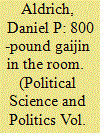

|
|
|
|
|
| Publication |
2009.
|
| Summary/Abstract |
Two ideographs make up the Japanese word gaijin, the first meaning "outside" or "out of place" and the second meaning "person." Hence gaijin literally means an outsider or foreigner, and in polite Japanese most speakers opt for the slightly less brusque sounding gaikokujin, which places the emphasis on the foreign nation (koku) from which the alien comes. But as political scientists doing fieldwork abroad, we are all foreigners, if not because of superficial differences such as pigmentation, accent, or dress, then because of our motivations and goals-gaining information, generating and testing hypotheses, and so forth. When we speak to informants abroad-whether in Japan, India, France, or elsewhere-to further our research, we may see ourselves as 800-pound gorillas who can bring conversations to a halt, generate unwanted propositions from nearby residents, and induce stares and pointing
|
|
|
|
|
|
|
|
|
|
|
|
|
|
|
|
| 2 |
ID:
092532


|
|
|
|
|
| Publication |
2009.
|
| Summary/Abstract |
The American economy and financial system is experiencing upheaval on a scale not seen since the Great Depression of the 1930s. A number of the largest and most established banks and investment firms have declared bankruptcy (including Bear Stearns and Lehman Brothers) or been taken over at fire-sale rates (as was the case, for example, with Merrill Lynch). In the fall of 2008, Congress and the U.S. Treasury along with the Federal Reserve Bank committed more than eight trillion dollars in payments, loans, and guarantees of various sorts to prop up financial institutions (including the semi-governmental mortgage entities, Fannie Mae and Freddie Mac) as well as the country's largest insurer, American International Group (AIG). The speed, number, and scope of these interventions lack historical precedent.
|
|
|
|
|
|
|
|
|
|
|
|
|
|
|
|
| 3 |
ID:
092544
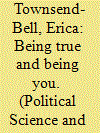

|
|
|
|
|
| Publication |
2009.
|
| Summary/Abstract |
Fieldwork advice has increased and improved over the years. Yet, the bulk of political science fieldwork advice is general; it assumes that the subject to whom advice is given is simply a political scientist-in training, perhaps-with no other salient identities that might intercede (but see Mazzei and O'Brien 2005 and the PS 2006 fieldwork symposium, The Methodologies of Field Research in the Middle East, for recent exceptions). Of course in reality it is not just the fieldwork setting that varies; the relationship of the researcher to the field matters a great deal-and that may be much more dependent on our specific identities than we have previously credited. It is not simply the subjects that we study, but us as well who have to negotiate sometimes sticky issues of race, class, gender, nationality, and so forth.
|
|
|
|
|
|
|
|
|
|
|
|
|
|
|
|
| 4 |
ID:
092552


|
|
|
|
|
| Publication |
2009.
|
| Summary/Abstract |
Based on the results of the 2008 presidential and congressional elections, an analysis using theories and methods of modern political science (pivotal politics theory, ideal point estimates, and bootstrap simulations) suggests that the conditions are ripe for real policy change. Specifically, we should expect policies to move significantly in a liberal direction, few or no policies should move in a conservative direction, and many of the outcomes will be moderate or somewhat to the left of center (rather than far left). Furthermore, the predictions depend as much on partisan polarization and the results of the congressional election as they do on the outcome of presidential election itself.
|
|
|
|
|
|
|
|
|
|
|
|
|
|
|
|
| 5 |
ID:
092556


|
|
|
|
|
| Publication |
2009.
|
| Summary/Abstract |
Compared to the popular vote, the Electoral College magnifies the perception of the winner's margin of victory. In this analysis, a method of quantifying the magnitude of the advantage given to the winner due to the Electoral College's two electoral vote add-on and winner-take-all methodologies is presented. Using the electoral vote distribution that was present in the 2000 U.S. presidential election, we analyzed one million random two-candidate simulated elections. The results show that the net effect of the Electoral College is to give the winning candidate an average 29.45 electoral vote advantage per election due to the winner-take-all methodology. This winner's advantage includes an average 0.42 electoral vote advantage given to the winner per election due to the two electoral vote add-on.
|
|
|
|
|
|
|
|
|
|
|
|
|
|
|
|
| 6 |
ID:
092548
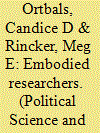

|
|
|
|
|
| Publication |
2009.
|
| Summary/Abstract |
Kathleen B. Jones, in her now famous essay about women-friendly polities, explains that that citizenship must be redefined to include a body that does not "easily fit military-corporate uniforms" (1990, 794). Jones calls theorists to recognize women's "embodied lives," and in doing so, considers how "women's bodies are problematic" and "sex/gendered identity affects … life" (786). We argue here that recognizing women's embodied lives is similarly important to a discussion of gender and fieldwork. As researchers in the field, we have been defined by our social position as women, thus putting us at distinct disadvantages and advantages (Sundberg 2003).
|
|
|
|
|
|
|
|
|
|
|
|
|
|
|
|
| 7 |
ID:
092563
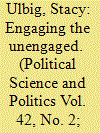

|
|
|
|
|
| Publication |
2009.
|
| Summary/Abstract |
As the nation witnesses a distinct decline in civic engagement among young adults, political science instructors across the nation face the formidable task of engaging students in lower-level, general education courses outside students' primary domain of interest. The research presented here seeks to understand if visually enhanced lecture material can effectively engage such students better than more traditional methods of classroom delivery. The project utilizes an experimental design involving two different sections of the same introductory American government course. By exposing the sections to different visual presentations, and controlling for a variety of potentially confounding factors, the impact that simple visual images have on student engagement both inside and outside the classroom are isolated. Findings suggest that the use of simple visual images can enhance students' impressions of the discipline of political science and boost their interest in and knowledge of politics and public affairs more generally.
|
|
|
|
|
|
|
|
|
|
|
|
|
|
|
|
| 8 |
ID:
092542
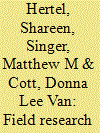

|
|
|
|
|
| Publication |
2009.
|
| Summary/Abstract |
The availability of relatively reliable and comparable data online and the increasing emphasis on statistical and formal research methods has led many political scientists to dismiss research in foreign countries as a waste of time and money. We leave that debate to others (see, e.g., Comparative Politics Organized Section 2005; Qualitative Methods Organized Section 2004). Instead, we offer suggestions for maximizing the contributions of fieldwork to the production of original research. We pay particular attention to research in developing countries owing to the unique challenges of undertaking research there, but we believe our insights are applicable to field research more generally.
|
|
|
|
|
|
|
|
|
|
|
|
|
|
|
|
| 9 |
ID:
092537
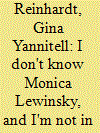

|
|
|
|
|
| Publication |
2009.
|
| Summary/Abstract |
On January 18, 1998, I walked off a plane in São Paulo, Brazil. As I cleared customs and weaved through the hot, steamy airport, the cafes and newsstands, I noticed one young woman's face on the front pages of all the newspapers and journals I passed. She was wearing a beret and hugging Bill Clinton in the photo, and her name was Monica Lewinsky. Never having heard of her before, I assumed the interest in her was specific to Brazil. Surely I would know her name if she actually mattered to anyone, I thought, and went on.
|
|
|
|
|
|
|
|
|
|
|
|
|
|
|
|
| 10 |
ID:
092554
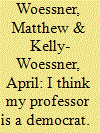

|
|
|
|
|
| Publication |
2009.
|
| Summary/Abstract |
Notwithstanding political science professors' concerted efforts to remain politically neutral in the classroom, we find evidence that students are able to successfully identify the partisan loyalties of their professors. Furthermore, we find that there is a tendency for students to drift toward the Democratic Party over the course of the semester, yet the direction of the shift appears to be unrelated to either the instructor's actual political loyalties, or to the student's perception of the professor's partisan preferences. Given that political science professors appear to exert no real influence on students' party loyalties, it is unclear whether efforts to diversify the field by hiring more Republican professors would actually reduce the "liberalizing" effects of higher education.
|
|
|
|
|
|
|
|
|
|
|
|
|
|
|
|
| 11 |
ID:
092558
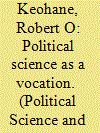

|
|
|
|
|
| Publication |
2009.
|
| Summary/Abstract |
This lecture was presented at the University of Sheffield on October 22, 2008, inaugurating the Graduate School of Politics; and at Oxford University on October 16, 2008. I have retained the lecture style for this publication, only making minor changes and additions in the text.
|
|
|
|
|
|
|
|
|
|
|
|
|
|
|
|
| 12 |
ID:
092553


|
|
|
|
|
| Publication |
2009.
|
| Summary/Abstract |
In a recent article in PS, Soroka and Wlezien (2008) argue that the policy preferences of low- and high-income Americans rarely differ, and therefore that "regardless of whose preferences policymakers follow … policy will end up in essentially the same place" (325). In this article, I analyze a much larger and more diverse set of policies than those examined by Soroka and Wlezien and show that income-based preference gaps are much larger and more widespread than their data suggest. In terms of federal government policy, the affluent are far better represented than the poor; the findings in this paper indicate that this representational inequality has substantial repercussions across a wide range of policy issues.
|
|
|
|
|
|
|
|
|
|
|
|
|
|
|
|
| 13 |
ID:
092551
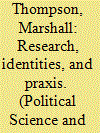

|
|
|
|
|
| Publication |
2009.
|
| Summary/Abstract |
Scientists seek to participate in the collective process of cumulative knowledge building. As scientists, we are bound to the principle of objective neutrality in the assessment of our data and in the formulation of our inferences and conclusions. However, the production of knowledge does not need to be, and some would say cannot be, a valueless process, devoid of opinion. The imperatives for the investigator are intellectual honesty, transparency in research, and objectivity in the assessment of data. If value judgments are accepted as permissible it is then worthwhile to discuss the relationships between the investigator's identity, those value judgments, and the design and conduct of research. Indeed, investigators possess multiple identities; these multiple identities may, at various times and places, aid or impede the research process. Moreover, these intersectional identities, and the inconsistency with which these identities are granted status in various environments, leave the researcher well positioned to explore social stratification, hierarchies of power, and inequality.
|
|
|
|
|
|
|
|
|
|
|
|
|
|
|
|
| 14 |
ID:
092567
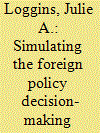

|
|
|
|
|
| Publication |
2009.
|
| Summary/Abstract |
A simulation of the foreign policy decision-making process, as described in this article, can assist an instructor in linking students' abstract understanding of complex political events, circumstances, and decision making to the real-world interplay of the multiple factors involved in decision making. It is this type of active learning that helps bring a student's abstract understanding into the concrete world. Instead of being passive learners relying on an instructor's knowledge, students are active participants in the learning process.
|
|
|
|
|
|
|
|
|
|
|
|
|
|
|
|
| 15 |
ID:
092561
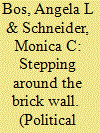

|
|
|
|
|
| Publication |
2009.
|
| Summary/Abstract |
Many political science departments offer, and increasing numbers of them require, undergraduate research methods courses. At the same time, studies cite high levels of student anxiety about such courses. Utilizing survey data from both students who take and faculty who teach methods, we conduct an analysis that compares the barriers students and faculty independently perceive. Next, we share results from our own exploratory assessment technique, which evaluates our success in increasing student confidence with regard to conducting research. Finally, we present specific exercises and assignments which can serve as solutions to student barriers. We argue that conscious reflection as to where students lack confidence and assessment of our efforts allows instructors to approach teaching methods more effectively.
|
|
|
|
|
|
|
|
|
|
|
|
|
|
|
|
| 16 |
ID:
092565
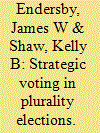

|
|
|
|
|
| Publication |
2009.
|
| Summary/Abstract |
Experiments designed as an election simulation involve participants in an investigation of strategic voting. Participants assigned political preferences and informed of candidate/party positions on an ideological dimension respond to and learn the results of two public opinion polls before voting. When given two alternatives, the participants vote sincerely. Confronted with three or more alternatives, participants make tactical decisions to narrow the field. Strategic behavior quickly reduces the number of alternatives to two. Consistent with Duverger's law, candidate/party viability encourages strategic voting and the development of a two-party system. The election simulation serves as a useful tool to teach about electoral behavior and to explore topics such as strategic voting.
|
|
|
|
|
|
|
|
|
|
|
|
|
|
|
|
| 17 |
ID:
092529
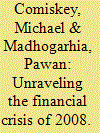

|
|
|
|
|
| Publication |
2009.
|
| Summary/Abstract |
In the fall of 2008, the world economy experienced a "once-in-a-century credit tsunami" (Greenspan 2008, 1). Centered in the market for homes and mortgages, the mechanisms that unleashed this financial tidal wave are many and complex. Indeed, an inadequate grasp of modern finance on the part of "the most sophisticated investors" and regulators "in the world" was itself a contributing factor (Greenspan 2008, 3).
|
|
|
|
|
|
|
|
|
|
|
|
|
|
|
|
| 18 |
ID:
092550


|
|
|
|
|
| Publication |
2009.
|
| Summary/Abstract |
In 1999, on a trip to Russia to study gender violence, I was sitting in on a special training at a Moscow police academy. In between jokes about the impossibility of prostitutes getting raped, the cops-in-training could not stop focusing on me, the one American and one of three women in a rowdy room. For example, one man loudly asked me whether all Americans had cars and followed up with a comment that, of course we did, because this is where "you" (meaning me) would have sex. The training on rape and sexual harassment that I had come to observe had come to a halt because the new police were so intent on making sexual jokes. These comments felt even more threatening than they might otherwise because, a few days before, I had been picked up by the Russian police, shoved into a police car with several drunken officers, and driven around Moscow until I offered a bribe.
|
|
|
|
|
|
|
|
|
|
|
|
|
|
|
|
| 19 |
ID:
092534


|
|
|
|
|
| Publication |
2009.
|
| Summary/Abstract |
After an exhausting 22-hour trip from St. Louis, I landed in Maputo, Mozambique, alone, for the first time in July 2003 to begin my dissertation research on women and women's organizations in Mozambique since democratization. I spent an hour talking to a young man who was returning home (to Maputo) from Brazil. Seeing it as an opportunity to practice my Portuguese with someone who spoke English, I did not realize that an hour had passed and my "welcoming party" still had not arrived. The young man and I switched from Portuguese to English as he began telling me the "cool places to hang out and get a drink" in Maputo. I had no idea who was coming to pick me up as I was armed only with the information that it was my in-country advisor's brother who would be there. As this young man and I were talking someone came up to me and asked, "Are you Frances?" With a sigh of relief, I said yes, and he replied, "I was here all of the time and I did not realize that you were here until I heard you speaking English with this young man. I did not recognize you; we thought you would be white."
|
|
|
|
|
|
|
|
|
|
|
|
|
|
|
|
| 20 |
ID:
092559
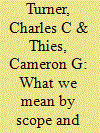

|
|
|
|
|
| Publication |
2009.
|
| Summary/Abstract |
Self-reflective political scientists have extensively reviewed the history of the discipline and argued over its future, but to date there has been little effort to systematically survey undergraduate scope and methods courses (for an exception see Thies and Hogan 2005). This lack of data leaves the discipline unable to assess how much we are teaching undergraduates about the scope of political science or, indeed, what we mean by the scope of the discipline. Similarly, though there have been many battles waged over the appropriateness of various methodologies, it is not clear how much of this discussion, or how many of these methods, make it into the undergraduate classroom. Survey results from a nation-wide sample of political science departments indicate that most departments require a scope and methods course of their majors and that, while there is a great deal of variety in topics covered, some common themes exist and some common assignments are used.
|
|
|
|
|
|
|
|
|
|
|
|
|
|
|
|
|
|
|
|
|